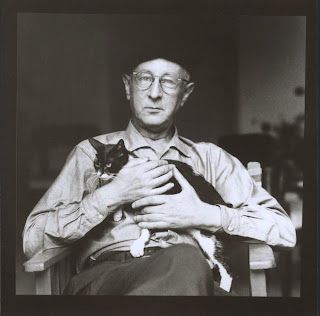Dvořák, trainspotter
Since sometime before the First World War there has been a general realization among both conservatives and radicals that the great romantic tradition of nineteenth-century Europe was in difficulties. It had become encrusted with so many bypaths that some sort of revision seemed inevitable, either to set it upon its feet again or to form from its honored remains a new style. ... Certainly a revolution began, but a gradual one – perhaps a series of small revolutions: first Satie, Debussy, Strauss; second Scriabin, Schönberg, and Stravinsky; then the deluge.
In the midst of nascent revolutions in music, and before the deluge, there was just enough time left for one more genuine romantic voice. Antonín Dvořák was certainly affected by the nationalistic aftermath of the Revolutions of 1848 (the so-called 'Spring of Nations'), but he was no revolutionary in either the political or musical sense. With strong flavors of the music from his native Czech background, he nevertheless made extensive use of the harmonic language and large form techniques of both Wagner and Brahms, but especially Brahms.
In 1874 Johannes Brahms dutifully agreed to sit on the jury of the Austrian State Stipendum which awarded financial support to promising composers within the Habsburg Empire. Brahms unexpectedly found himself faced with a massive submission – 15 works including two symphonies – from an obscure Czech composer. He was overwhelmed by the talent and technical mastery of this unknown composer, Antonin Dvořák. From that point on Brahms became his mentor, close friend, and his most important compositional influence. (And yes, Dvořák was awarded the prize.)
In 1874 Johannes Brahms dutifully agreed to sit on the jury of the Austrian State Stipendum which awarded financial support to promising composers within the Habsburg Empire. Brahms unexpectedly found himself faced with a massive submission – 15 works including two symphonies – from an obscure Czech composer. He was overwhelmed by the talent and technical mastery of this unknown composer, Antonin Dvořák. From that point on Brahms became his mentor, close friend, and his most important compositional influence. (And yes, Dvořák was awarded the prize.)
It is virtually impossible to sort out the traditional and contemporary influences resulting in Dvořák’s amazing skills as a craftsman. We can pick out Czech folk music, both obvious and deeply embedded. We can identify characteristic 'new' harmonic practices inspired by the contemporary theorist Hugo Riemann. At times we actually hear Brahms himself (and many are the experts that have been occasionally fooled). But in the end, if we don't overthink it, always we know we are hearing Dvořák.
The Piano Trio, Op. 65, was composed in 1883, the same year that Brahms penned his Third Symphony. Dvořák's mother died in December 1882 and he began work on the Trio six weeks later. Just as he was beginning its composition, on February 13, Richard Wagner died. The old order was coming to an end in many ways. There is a solemnity in this trio – some have called it his 'most Brahmsian' work. But creative genius is difficult to nail down so easily. This work contains a puzzle.
The startlingly strange little second movement doesn't seem to fit with the three other movements, either in length or character. Dvořák never wrote anything about this trio, let alone this movement, so there's no way to know what was in his head at the time. The likely guess would be 'relief' between the drama of the first movement and the stunning beauty of the third – but why the unrelenting 2-against-3 rhythm? Its marking, 'Allegretto grazioso', doesn't help much. It's not quite a scherzo, not quite a dance. It's lilting, but it's not really light. What is it, then? It may not solve the puzzle, but here's one clue ....
Allegretto Grazioso movement from a 1967 recording of the Dvořák F-minor Trio.
Performed by the Suk Trio: violin, Josef Suk (Jr.), grandson of the composer-violinist Josef Suk & great-grandson of Antonín Dvořák; cello, Josef Chuchro; piano, Jan Panenka.
Dvořák was in a very real sense a calm island on the eve of the 20th century. He lived in the midst of revolutions – political, musical, industrial. He couldn't have failed to be affected by all these, but somehow he remained above them. This is the final puzzle about Antonín Dvořák. We need another clue that might suggest a solution.
The Czech playwrite and statesman Vaclav Havel was a leader of the 'Velvet Revolution' that toppled communism in Czechoslovakia in 1989. He went on to be the President of Czechoslovakia and then the Czech Republic for nearly 14 years. He once wrote a few words about Dvořák that reverberate even today:
Antonín Dvořák is one of the great figures in Czech history who showed us how best to integrate ourselves into broader world contexts by being good at what we do and by doing our own work well. He, himself, entered international consciousness not by shouting his name to the world and by pointing his finger at himself, but through his entire being, through his work, his achievements, and also through his spirituality.
Dvořák F-minor Trio
Norfolk Chamber Music Festival, July 21, 2017
Peter Frankl, pf; Sharon Roffman, vl; Peter Eom, vc





Comments
Post a Comment